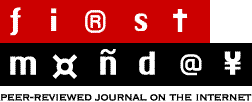History
According to the chief editor, Edward Valauskas, the journal emerged before the open access model emerged:
"We didn't call it open access in 1995 but we were certainly a precursor to the whole notion of open access. We felt very strongly that the journal should have all its content made freely available and we insisted with [the Danish publisher] Munksgaard that the scholars who contributed would retain copyright of their work that they published in the journal. We felt it would encourage scholars to contribute and then re-use their content in lots of different ways". [1]
First Monday is among the first peer-reviewed journals on the Internet. [2] It originated in the summer of 1995 with a proposal to start a new Internet-only, peer-reviewed journal about the Internet by eventual editor-in-chief Edward J. Valauskas to Munksgaard, a Danish publisher. Munksgaard agreed to publish the journal in September 1995. [3] The first issue appeared on 6 May 1996, the first Monday of May, also the opening of the Fifth International World Wide Web Conference in Paris. The first issue was distributed at that conference on diskette as well as released on the Internet from a server in Copenhagen at the address www.firstmonday.dk.
In December 1998, Munksgaard sold the journal to three of the editors: Edward J. Valauskas, Esther Dyson, and Rishab Aiyer Ghosh. The server was moved from Copenhagen to the University of Illinois at Chicago's Library. The first issue based on a server in Chicago appeared 4 January 1999.
This page is based on this
Wikipedia article Text is available under the
CC BY-SA 4.0 license; additional terms may apply.
Images, videos and audio are available under their respective licenses.
